
This short summery provides the key features of Consumer Protection Act 1986. the main object of this course to provides the basic information of Consumer Protection Act.

This short summery provides the key features of Consumer Protection Act 1986. the main object of this course to provides the basic information of Consumer Protection Act.
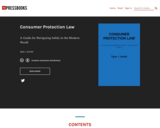
A Guide for Navigating Safely in the Modern World
Word Count: 20232
(Note: This resource's metadata has been created automatically by reformatting and/or combining the information that the author initially provided as part of a bulk import process.)
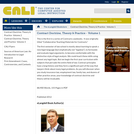
This is Volume 1 in a three volume series written for Contracts Law. The first semester of law school is mostly about learning to speak a new legal language (but emphatically not ŇlegaleseÓ), to formulate and evaluate legal arguments, to become comfortable with the distinctive style of legal analysis. We could teach these skills using almost any legal topic. But we begin the first-year curriculum with subjects that pervade the entire field of law. Contract principles have a long history and they form a significant part of the way that lawyers think about many legal problems. As you will discover when you study insurance law, employment law, family law, and dozens of other practice areas, your knowledge of contract doctrine and theory will be invaluable.
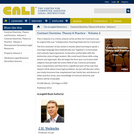
This is Volume 2 in a three volume series written for Contracts Law. The first semester of law school is mostly about learning to speak a new legal language (but emphatically not "legalese"), to formulate and evaluate legal arguments, to become comfortable with the distinctive style of legal analysis. We could teach these skills using almost any legal topic. But we begin the first-year curriculum with subjects that pervade the entire field of law. Contract principles have a long history and they form a significant part of the way that lawyers think about many legal problems. As you will discover when you study insurance law, employment law, family law, and dozens of other practice areas, your knowledge of contract doctrine and theory will be invaluable.
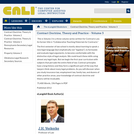
This is Volume 3 in a three volume series written for Contracts Law. Its former title is "Collaborative Teaching Materials for Contracts."
The first semester of law school is mostly about learning to speak a new legal language (but emphatically not “legalese”), to formulate and evaluate legal arguments, to become comfortable with the distinctive style of legal analysis. We could teach these skills using almost any legal topic. But we begin the first-year curriculum with subjects that pervade the entire field of law. Contract principles have a long history and they form a significant part of the way that lawyers think about many legal problems. As you will discover when you study insurance law, employment law, family law, and dozens of other practice areas, your knowledge of contract doctrine and theory will be invaluable.
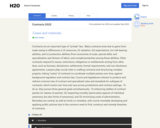
Contracts are an important type of "private" law. Many contracts arise due to gains from trade owing to differences in (i) resources, (ii) valuation, (iii) expectations, (iv) risk-bearing abilities, and (v) production abilities (from economies of scale, special skills, and specialization and division of labor), and complementarities among those abilities. Other contracts respond to issues, restrictions, obligations or entitlements arising from other laws, such as licenses, disclaimers, settlements, formal requirements, and non-disclosure agreements. Lawyers play crucial roles in crafting contracts and structuring complex projects, linking "suites" of contracts to coordinate multiple parties over time, against background regulation and contract law. Courts and legislatures interact to produce and redirect common law of contract and specialized rules and standards for subtypes of contracts, which evolve over time and vary across jurisdictions and contract settings. To do so, they pursue three general goals simultaneously: (1) enhancing welfare of contract parties (or classes of parties), (2) respecting morality (particularly aspects of individual autonomy, but also limits of autonomy), and (3) minimizing costs of administration. Remedies are central, as well as limits on remedies, with courts inevitably developing and applying public policies due to the common need to find, construct and remedy breaches of contracts.

Contracting often facilitates happiness. It enables us to do things we would otherwise be unable to do and thus to live more fully, richly, enjoyably. We enter into contracts constantly, often with little consciousness about legal consequences. Typically we become self-conscious only when a problem arises. Our course will mainly be about problems arising from contracting. It is largely an exploration of contract pathology. Before we turn to problems, however, I want to emphasize ways in which contracting is satisfying.
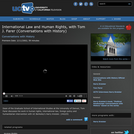
Dean of the Graduate School of International Studies at the University of Denver, Tom Farer discusses his work in human rights, international law, foreign policy and humanitarian intervention with UC Berkeley's Harry Kreisler. (59 min)
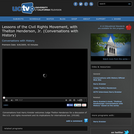
Conversations host Harry Kreisler welcomes Judge Thelton Henderson for a discussion of the U.S. civil rights movement and its implications for international law. (43 min)
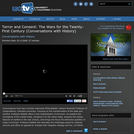
Conversations host Harry Kreisler welcomes Philip Bobbitt, Herbert Wechsler Professor of Jurisprudence, Columbia University. Focusing on the transformation of the state and warfare, Professor Bobbitt offers a new interpretation of terrorism. He explains the emergence of the market state, compares it to the nation state, analyzes the unique features of warfare in the new century, and brings into focus the distinctive qualities of today's terrorism. Professor Bobbitt also describes the challenges posed for national security and offers an agenda for changes that integrate strategy and law. (57 minutes)
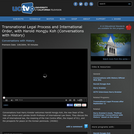
Conversations host Harry Kreisler welcomes Harold Hongju Koh, the new Dean of the Yale Law School and Latrobe Smith Professor of International Law there. They discuss the role of international law, the meaning of the Iran Contra Affair, the impact of 911, and the prospects for peace on the Korean peninsula. (55 min)

In using copyright works (e.g. journals or newspaper articles, books, photographs, music) for study or research you are expected to observe certain legal and ethical constraints. In particular, you are bound to abide by the law of copyright.
This resource helps you to see how copyright could affect the way you study, research and work while at university.
This resource is suitable for all levels of study.
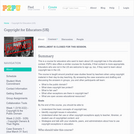
This course is for educators and learners who wants to understand how copyright affects use of learning materials, and how to use copyright to facilitate education. The course is focused on developing practical solutions. The reading won't always give these to you, its up to you to devise practical solutions based on the reading.

This week, Stan Muller teaches you the basics of copyright in the United States. Copyright law is territorial, so we're going to cover the system we know the most about, and that's the US. Stan will talk about what kind of ideas can be copyrighted, who can get a copyright, and what protections the copyright grants. We'll also talk about the always contentious and seemingly ever-growing term of copyright. Stan will also teach you about the low bar for creativity, which means that original work doesn't have to be all that original, and he'll also touch on the problems with copyright in the modern world.
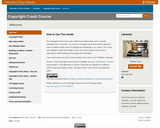
The Copyright Crash Course was created by Georgia Harper and is currently maintained by UT Libraries. The Course is arranged into several sections that allow users to explore certain areas of copyright law individually or as a group. The Course was originally created with faculty in mind, but can be used by anyone who is interested in understanding and managing their copyrights.

Stan Muller teaches you a few things about copyright enforcement and talks about the exceptions to copyright enforcement. While there are several, the one you've probably heard of is Fair Use, and it's a pretty tricky one. We'll try to explain it and teach you just why fair use is so loosey-goosey.
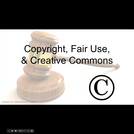
This lesson was created to introduce learners to Copyright law, the Fair Use Doctrine, and the Creative Commons.
![Copyright History [learning module]](https://img.oercommons.org/160x134/oercommons/media/upload/materials/screenshots/materials-course-277206.png)
This interactive learning module explores the history of copyright right from the “Battle of the Book” in the 6th century, through the invention of the printing press; and up to the 1968 Australian Copyright Act. It aims to provide an understanding of why the laws were necessary and what their implications are for today’s world. After completing this module, students should be able to:
* explain the drivers for and rationale of early copyright legislation;
* understand the impact of the printing press on historical concepts of authorship and copyright legislation;
* define modern copyright; interpret Australian copyright principles;
* evaluate the suitability of current copyright and
* defend the need for copyright reform in the future.
This module can be downloaded and embedded in course sites.
Please note: a few of the supplementary/additional (non-core) resources linked to in this resource are restricted to University of South Australia staff and students. These have been clearly annotated. This module has been created using H5P software.

Copyright Law: Cases and Materials is a free copyright law textbook designed for a four-credit copyright course, which is what we teach at NYU School of Law. Model syllabi for four-credit and three-credit courses are available in the Faculty Resources section of this website. All faculty teaching copyright law are welcome to access the Faculty Resources, including the faculty discussion forum, by becoming a registered user of the site. To register, write us at jeanne.fromer@nyu.edu or christopher.sprigman@nyu.edu.
The textbook is made available under a Creative Commons Attribution-NonCommercial-NoDerivatives 4.0 International License. Under the terms of this license, you are free to copy and redistribute the textbook in part or whole in any format provided that (1) you do so only for non-commercial purposes, and (2) you comply with the attribution principles of the license (credit the authors, and link to the license). Note please that this license does not permit you to make modifications to the textbook or to create derivative works. That said, there are a wide variety of derivatives that we would gladly permit. If you want to make modifications to the textbook, please contact us.